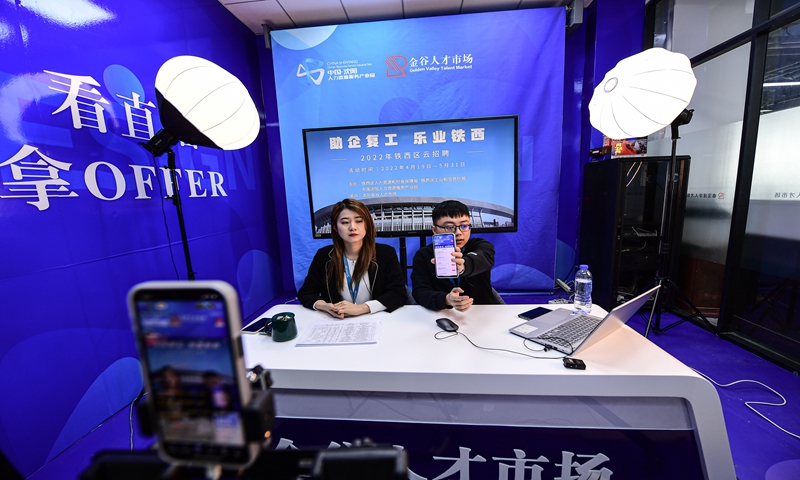
A live broadcast job fair held in Shenyang, Northeast China's Liaoning Province, on April 18, 2022 Photo: VCG
Special livestreams are being held across China over recent days. Instead of selling products, these livestreams "sell" jobs. Tesla China and Foxconn have joined the craze.
Analysts said that the new live job fairs will greatly boost employment in China, especially for manufacturing industry, as live broadcasts will help change the cliché that the young generation have toward factory jobs.
On Thursday night, Tesla China's official WeChat account for recruitment held a special job fair via live broadcast focusing on intelligent manufacturing.
Currently, Tesla China has 223 vacant managerial positions and engineer positions in intelligent manufacturing. More than 20 of them were posted on the Thursday live recruitment session. And in May, Tesla China posted more than 1,000 vacancies on social media, for posts such as aerodynamics engineers, supply chain managers, store managers and factory supervisors.
According to Tesla's WeChat account, similar live job fairs will be held online every Thursday in June. While such large-scale recruitment is being conducted in China, Tesla reportedly plans to cut 10 percent of its global workforce.
On Monday, Foxconn opened live recruitment on short-video platform Kuaishou, which it said is a first step in exploring digital recruitment and boosting employment.
A total of 880 jobs were released to help people with disabilities achieve stable career development and access to the labor market. The follow-up recruitment sessions will be mainly aimed at the recruitment of skilled workers, according to a statement Foxconn sent to the Global Times on Friday.
In the future, Foxconn will make full use of the advantages of the digital platform represented by Kuaishou and employ talent in innovative ways such as livestreaming job fair and short video recruitment, to promote the healthy development of the employment market and help stabilize employment.
"With the help of digitalization and the internet, recruitment is at your fingertips in the cloud. This is not only a cross-industry cooperation of Foxconn in the field of human resources, but also a reflection of the deep integration of real economy and digital economy," said Foxconn Chief Commercial Officer.
Tesla and Foxconn are two representatives of the livestreaming recruitment. According to the official WeChat account of Tongzhou district government of Beijing, a total of 56 enterprises will post more than 1,500 jobs of 230 categories on Friday night, through live broadcast.
Such live job fairs are held nationwide since May 16 and will last until August 25. More than 10 million jobs are expected to be created, according to the Ministry of Human Resources and Social Security.
Livestreaming recruitment will boost employment in China, especially for the manufacturing sector, Pan Helin, joint director of the Research Center for Digital Economics and Financial Innovation affiliated with Zhejiang University's International Business School, told the Global Times on Friday.
"The advantage of this model is the transparency and visibility of occupational content and work environment. In the context of the tight employment situation, it alleviates the anxiety of workers entering the factory by directly showing the job prospects," Pan said.
At the same time, in the context of the epidemic, live recruitment can overcome the geographical and time constraints to help young people find jobs more efficiently, conveniently, safely and reliably, which will help stabilize employment, Wang Peng, an assistant professor at the Gaoling School of Artificial Intelligence at the Renmin University of China, told the Global Times on Friday.
"Livestreaming is more popular among the younger generation, which is more conducive to the dissemination of recruitment information. In the future, livestreaming recruitment may also develop into cloud job fair, or even metaverse recruitment," said Wang.
Wang noted that livestreaming recruitment is a good example of the integration of the digital economy and actual production.
The popularity of livestreaming among the young generation is important, as live broadcasting can more directly showcase new types of jobs, especially in the factories, and break the stereotype of "factory worker" among the younger generation, analysts said.
"Future manufacturing, especially high-end manufacturing, is an important direction for youth employment. But generally speaking, young people prefer to work in offices rather than factories. From the perspective of market demand and social development, with further integration of digitalization and manufacturing, more and more intelligent manufacturing needs new skilled workers," said Wang.
The rising demand for skilled workers is also in line with China's economic transformation.




